DOWNLOAD NEWS 2015/3
by Brian Wilson, Dan Morgan and Geoffrey Molyneux.
Reviews are by Brian Wilson unless stated otherwise.
DL News 2015/2 is here.
I have given links to classicsonline.com but by the time that you read
this review it will have been replaced by COL HD:LL, a high-density
streaming and download service.
Despite the common belief that the classical record industry is in terminal
decline, there have been so many fine recordings recently that, despite
my New Year resolution to do my reviews in full on the main MusicWeb
International page, they are piling up in my ‘to do as full reviews’
tray, so some of what follows are first thoughts and brief pointers.
A mention here does not preclude a review of my more detailed thoughts
on the main MusicWeb International pages.
Index 2015/3:
ALWYN Prelude and Derrybeg Fair from The Fairy Fiddler:
RSNO/Yates (+ JOUBERT, MARTELLI)_Dutton
ARNOLD The Roots of Heaven; David Copperfield:
Moscow SO/Stromberg_Naxos
ARNOLD Symphony No.7; Symphony No.8: NSO of Ireland/Penny_Naxos
BACH C.P.E. Symphonies: OAE/Miller_Signum
BEETHOVEN Piano Sonatas 30-32: Le Sage_Alpha
BIZET Roma, etc: RTÉ National SO/Tingaud_Naxos
2xHD
BOCCHERINI Stabat mater; d’ASTORGA Stabat mater:
King’s Consort_Hyperion Helios
BORODIN Symphony No.2 – see Art of Rafael Kubelík
CAVALIERI Rappresentatione di anima et di corpo: Jacobs_Harmonia
Mundi
CHARPENTIER at the Chapelle Royale de Versailles: Savall (Alia
Vox)
CHARPENTIER Leçons de Ténèbres pour le Mercredy Sainct;
Jacobs_Harmonia Mundi D’Abord
CHILCOTT St John Passion: Wells Cathedral/Owens_Signum
CLÉRAMBAULT Miserere: Le Poème Harmonique
(+ COUPERIN, F)_Alpha
COUPERIN François Trois Leçons De Ténèbres du premier
Jour: Le Poème Harmonique (+ CLÉRAMBAULT)_Alpha
DUKAS L’Apprenti Sorcier; Symphony: RTÉ National SO/Tingaud_Naxos
2xHD
ELGAR King Olaf; The Banner of Saint George: Bergen PO/Davis_Chandos
ELGAR Sea Pictures; The Dream of Gerontius: BBCSO/Davis_Chandos
ELGAR Introduction and Allegro, Serenade for Strings,
etc: see And the Bridge is Love
ELLIS Concert Music, etc.: Various_Divine Art
EŠENVALDS Passion and Resurrection: Polyphony/Layton_Hyperion
EŠENVALDS Northern Lights and other choral works: Layton_Hyperion
FINE Complete Orchestral Works_Boston MOP/Rose_BMOP/Sound
GUERRERO: The Sixteen (+ LOBO)_Coro
GUERRERO Missa de la battalla: Westminster Cathedral
Choir_Hyperion Helios
HANDEL Joshua: Cummings_Accent
HINDEMITH Hindemith conducts Hindemith _Naxos Archives
HOLST Military Band Music_RAF Central Band (+ VAUGHAN WILLIAMS)_Chandos
JANÁČEK Taras Bulba - see Art of Rafael Kubelík
JOUBERT Symphony No.2: RSNO/Yates (+ ALWYN, MARTELLI)_Dutton
KHACHATURIAN Symphony No.2; Gayaneh excs_Khachaturian_Beulah
KINSELLA Symphony No.5, Symphony No.10: RTÉ NSO/ Pearce;
Irish CO/Takacs-Nagy_Toccata
LALANDE Leçons de Ténèbres: Ensemble Correspondances_Harmonia
Mundi
LISZT Sonata, etc: Hewittt_Hyperion; Codispoti_Odradek
LOBO: The Sixteen (+ GUeRRERO)_Coro
MARTELLI Symphony: RSNO/Yates (+ ALWYN, JOUBERT)_Dutton
MARTIN Jubilate Deo: Magdalen College/Hyde_Opus Arte
MESSIAEN Des Canyons aux Étoiles: LPO/Eschenbach_LPO
MESSIAEN Oiseaux Exotiques, La Bouscarle,
Réveil des Oiseaux: Loriod/Neumann_Supraphon
MILFORD Chamber Music: Gould Piano Trio, etc._Toccata
MUSSORGSKY Pictures at an Exhibition; Night on a Bald
Mountain (arr. 8 Horns): The German Hornsound (+ PROKOFIEV, TCHAIKOVSKY)_Genuin
NIELSEN Symphonies 1 and 3: Stockholm PO/Oramo_BIS
O’CONNELL North; Four Orchestral Pieces; Symphony: RTÉ SO_RTÉ
PAINE Symphony No.2, etc.: Ulster O/Falletta_Naxos
Prokofiev Piano Concertos No.2 and No.3: Demidenko/Lazarev_Hyperion
Helios
PROKOFIEV Cello Concerto in e minor: Isserlis_Hyperion (+ SHOSTAKOVICH
Cello Concerto No. 1)
PURCELL The Indian Queen: The Sixteen (+ Daniel PURCELL
Masque of Hymen)_Coro
RACHMANINOV All-night Vigil: Phoenix, Kansas
City Chorales/Bruffy_Chandos
RUEHR O’Keeffe Images, etc.: BMOP/Rose_BMOP/Sound
SHCHEDRIN Piano Concerto No.5: Matsuev/Gergiev (+ SHOSTAKOVICH)_Mariinksy
SCHEIN and the Leipzig Stadtpfeifer tradition: InAlto_Ramée
SCHNITTKE Symphony No.3: Rundfunk-SO Berlin/Jurowski_Pentatone
SCHÜTZ St. Matthew Passion: Rademann_Carus
SHOSTAKOVICH Cello Concerto No. 1: Isserlis_Hyperion (+ PROKOFIEV)
SHOSTAKOVICH Piano Concertos: Matsuev/Gergiev (+ SHCHEDRIN) _Mariinksy
STEFFANI Niobe Regina di Tebe: Covent Garden/Engelbrock_Opus
Arte
STRAUSS Richard Don Juan, Ein Heldenleben: Bavarian RSO/Jansons_BR-Klassik
SOUSA etc. American Military Music_Beulah
SUK Quartets, Piano Quintet: Minguet Quartet_CPO
TELEMANN Overtures and Concertos for Darmstadt: Les Ambassadeurs_Carus
VAUGHAN WILLIAMS Folk Song Suite_RAF Central Band (+ HOLST)_Chandos
And the Bridge is Love: English String Music: ECO/Lloyd
Webber_Naxos/2xHD
Art of Rafael Kubelík: Borodin, Janacék and Dvorák_Beulah
Guerre et Paix: War and Peace in Baroque Europe - 1614-1714:
Savall_Alia Vox
Music of the Realm: Byrd, Tallis, Morley, Weekes and Gibbons:
Queen’s Six_Resonus
La Pellegrina: Intermedii, 1589: Sempé_Paradizo
Spirit, Strength and Sorrow: Stabat Mater:
The Sixteen_Coro
***
Music of the Realm: Tudor Music for Men’s
Voices
The Queen’s Six (Daniel Brittain, Timothy Carleston (counter-tenor);
Nicholas Madden, Dominic Bland (tenor); Andrew Thompson (baritone);
Simon Whiteley (bass))
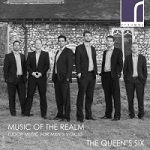 RESONUS
RES10146 [63:56] Details and download from resonusclassics.com
(mp3, aac, 16- and 24-bit lossless) or eclassical.com
(mp3, 16- and 24-bit lossless), both with pdf booklet containing texts
and translations.
RESONUS
RES10146 [63:56] Details and download from resonusclassics.com
(mp3, aac, 16- and 24-bit lossless) or eclassical.com
(mp3, 16- and 24-bit lossless), both with pdf booklet containing texts
and translations.
Music of the Realm includes music to Latin and English texts
by Tudor composers, William Byrd, Thomas Tallis, Thomas Morley, Thomas
Tomkins, Thomas Weelkes and Orlando Gibbons, the last-named an intruder,
since most of his music is actually Stuart rather than Tudor, as the
notes admit, but very welcome for all that. The performers are The
Queen’s Six, here making their mainstream recording debut apart
from an earlier EP.
The group’s distinctively smooth tones are well suited to contemplative
music and to the less florid works composed after the Reformation and
that’s mostly what they perform here. It would be interesting to hear
them sing earlier Tudor music, perhaps in a sequel. The 24-bit recording
is very good.
Flight of Angels
Francisco GUERRERO (1532-97)
Duo seraphim; Vexilla regis; Gloria from Missa Surge propera;
Laudate Dominum a8; Maria Magdalene; Credo from Missa
de la batalla escoutez; Agnus Dei I & II from Missa Congratulamini
mihi
Alonso LOBO (c.1555-1617)
Kyrie from Missa Maria Magdalene; Libera me; Ave Regina cœlorum;
Ave Maria; Versa est in luctum
The Sixteen/Harry Christophers
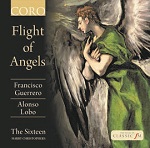 CORO
COR16128 [63:52] Details, sample track and download from thesixteendigital.com
(mp3, aac and lossless, with pdf booklet containing texts and translations).
CORO
COR16128 [63:52] Details, sample track and download from thesixteendigital.com
(mp3, aac and lossless, with pdf booklet containing texts and translations).
Flight of Angels contains all the music from The Sixteen’s Choral
Pilgrimage 2015. Fans of The Sixteen and of the intensely beautiful
16th-century Spanish music will need no urging from me to
buy their latest album. The recording is very good and Martyn Imrie’s
notes are particularly valuable. The download contains an additional
bonus track.
If you are left wondering where to go next, there’s a wonderful bargain
on Hyperion Helios CDH55340 –
review and Hyperion
Top 30 – coupling performances by Westminster Cathedral Choir of
Guerrero’s Duo Seraphim included in the Coro collection and the
complete Missa de la batalla, from which The Sixteen give us
just the Credo.
La Pellegrina : Intermedii, 1589
Dorothée Leclair, Monika Mauch (sopranos)
Pascal Bertin (alto)
Stephan van Dyck, Jean-François Novelli (tenors)
Antoni Fajardo (bass)
Capriccio Stravagante Renaissance Orchestra, Collegium Vocale Gent/Skip
Sempé
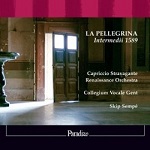 rec.
live, May 2007, Palais des Beaux-Arts, Brussels. DDD
rec.
live, May 2007, Palais des Beaux-Arts, Brussels. DDD
PARADIZO PA0004 [68:54] – from Qobuz (No
booklet with streamed or download version)
These Intermedii, often regarded as forerunners of opera, here
receive fine performances which rival the classic recording with Emma
Kirkby, Tessa Bonner, Emila van Evera, Nigel Rogers, The Taverner Consort,
Choir and Players directed by Andrew Parrott. Originally released on
EMI Reflexe in 1988 in de luxe format, that was long absent
from the catalogue but has recently returned in a simpler format on
Virgin/Erato Rediscoveries 6026842. Download from 7digital.com
for £6.99 (mp3, no booklet). This is enjoyable music whichever version
you choose.
For full details please see my review.
Emilio de CAVALIERI (c.1550-1602)
Rappresentatione di anima et di corpo, per recitar cantando, dramma
in 1 prologo e 3 atti in collaborazione con Padre Agostino Manni
(Rome 1600)
Marie-Claude Chappuis (mezzo) - Anima
Johannes Weisser (baritone) - Corpo
Gyula Orendt (bass-baritone) - Tempo, Consiglio
Mark Milhofer (tenor) - Inteletto, Piacere
Marcos Fink (bass-baritone) - Mondo, Secondo Compagno di Piacere, Anima
dannata
Chor der Staatsoper, Berlin
Concerto Vocale
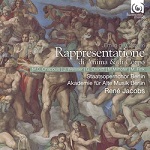 Akademie
für Alte Musik Berlin/René Jacobs
Akademie
für Alte Musik Berlin/René Jacobs
rec. May 2014, Teldex Studio, Berlin. DDD.
Texts and translations included
HARMONIA MUNDI HMC902200/1 [38:16 + 54:34] – from eclassical.com
(mp3, 16- and 24-bit lossless with pdf booklet)
Both René Jacobs on this recording and Christina Pluhar on Alpha make
the music attractive and both effectively convey the variety, from intimate
to ceremonial, very effectively. Both are well recorded and both are
well documented. Though I lean slightly towards the new Jacobs recording
with its more varied instrumentation, it’s a close call. If you enjoy
baroque opera and oratorio, you should at least try this very persuasive
recording of one of the earliest examples before either had a name.
Please see my full review.
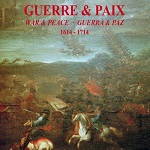 Guerre
et Paix: War and Peace in Baroque Europe - 1614-1714
Guerre
et Paix: War and Peace in Baroque Europe - 1614-1714
See review
(Recording of the Month) for full list of contents
Hesperion XXI, Le Concert des Nations, La Capella Reial de Catalunya/Jordi
Savall
rec. 1996-2014, Collegiale de Cardona, Fontfroide Abbey and Chapel Royal
of Versailles, Salzburg Cathedral
ALIA VOX AVSA9908 [75:54 + 77:49] – from 7digital.com
(mp3 and lossless, no booklet) stream or download from Qobuz
(16- and 24-bit lossless, with pdf booklet)
There’s very little that I need add to Simon Thompson’s enthusiastic
review.
I’m a confirmed fan of all that Jordi Savall does – see also the Charpentier
review below – and this is one of his greatest achievements.
The 7digital download is less expensive but you need at least to stream
from Qobuz if you want the (excellent, 396-page) booklet with all the
texts.
Henry PURCELL (1659-1695) The Indian Queen, Z630 (1695)
[59:18]
Daniel PURCELL (1664-1717) The Masque of Hymen (1695)
[13:09]
The Sixteen/Harry Christophers
rec. St Augustine’s Church, Kilburn, London, 22-24 September 2014
CORO COR16129 [72:27] Details/download (mp3, aac and 24-bit lossless,
with pdf booklet containing texts) from thesixteendigital.com
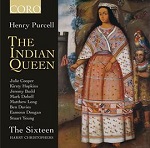 Though
The Indian Queen is hardly of the same quality as Dido and
Æneas, it well deserves the attention which it has received on record
in recent years. Surprisingly one of the best, Catherine Mackintosh’s
very fine Linn recording with The Purcell Simfony, is no longer available
on disc, temporarily I trust, but remains as a download in mp3 or lossless
sound, albeit without booklet (CKD035
–January
2009 DL Roundup). It’s also available in mp3 from classicsonline.com
but, again, without booklet.
Though
The Indian Queen is hardly of the same quality as Dido and
Æneas, it well deserves the attention which it has received on record
in recent years. Surprisingly one of the best, Catherine Mackintosh’s
very fine Linn recording with The Purcell Simfony, is no longer available
on disc, temporarily I trust, but remains as a download in mp3 or lossless
sound, albeit without booklet (CKD035
–January
2009 DL Roundup). It’s also available in mp3 from classicsonline.com
but, again, without booklet.
If you followed my recommendation
and bought either the Decca 50-CD Baroque Era set or Volume 1
of the downloads of that set, you will already have the fine recording
of this work made by Emma Kirkby and others with the Academy of Ancient
Music directed by Christopher Hogwood, released in 1996. That version
also remains available separately on mid-price Decca 4750522
or with Dido and Æneas on budget-price Decca 4783404.
The new recording falls neatly between Hogwood’s larger-scale recording
and the more intimate version from the Purcell Simfony and, like the
Decca, it comes with the masque which Henry Purcell wrote to round off
the work which his brother (cousin?) had left unfinished. Even as a
download the Coro recording comes complete with texts and is available
in 24-bit sound, which may swing the balance in its favour. Whichever
of these three versions you choose, you won’t go far wrong.
Johann Hermann SCHEIN (1586-1630)
Ich will schweigen: Johann Hermann Schein and the Leipzig
Stadtpfeifer tradition
Alice Foccroulle (soprano)
Béatrice Mayo-Felip (soprano)
Reinoud Van Mechelen (tenor)
Marc Meisel (organ: a = 440-442 Hz; tuned in meantone temperament with
7 pure thirds (D#/ E-flat at compromise pitch)).
InAlto/Lambert Colson
rec. January 2014, Gottorf Castle, Schleswig, Germany. DDD.
CD booklet includes texts and translations - not supplied with download.
Reviewed as 24-bit lossless download, also available in mp3 and 16-bit
lossless.
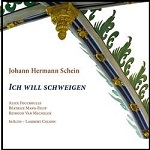 RAMÉE
RAM1401 [62:42] – from eclassical.com
(mp3, 16- and 24-bit lossless) or stream from Naxos
Music Library with booklet.
RAMÉE
RAM1401 [62:42] – from eclassical.com
(mp3, 16- and 24-bit lossless) or stream from Naxos
Music Library with booklet.
Details and review here.
The music is all attractive: it’s often highly indebted to the likes
of the Gabrielis, but none the worse for that, with no indication that
the Thirty Years War was devastating swathes of North Germany at the
time.
Several of the works included have no rivals in the current UK catalogue.
Performances from the three soloists and the instrumentalists make a
strong case for this repertoire and the late 16th-century
organ of Gottorf Castle is ideal for the music. This is a collection
to which I shall be returning, but the lack of a booklet is problematic.
Heinrich SCHÜTZ (1587-1672)
Litania, SWV458 [9:24]
Ulrike Hofbauer (soprano), Ludger Rémy (organ), Sarah Perl (violone)
O du allersüßester und liebster Herr Jesu, SWV340 [5:49]
Ulrike Hofbauer (soprano), Isabel Jantschek (soprano), Stefan Kunath
(alto), Tobias Mäthger (tenor), Felix Schwandtke (bass), Ludger Rémey
(organ), Margret Baumgartl (violin), Karina Müller (violin), Sarah
Perl (violone)
In dich hab’ich gehoffet, Herr, SWV446 [4:03]
Matthäus-passion (St Matthew Passion, 1666), SWV 479 [51:01]
Georg Poplutz (tenor), Felix Rumpf (bass), Stefan Kunath (alto), Cenek
Svoboda (tenor), Tobias Mäthger (tenor), Felix Schwandtke (bass), Martin
Schicketanz (bass), Isabel Jantschek (soprano), Sandra Bernhardt (soprano),
Franziska Neumann (contralto)
Dresdner Kammerchor/Hans-Christoph Rademann
CARUS 83.259 [70:17] – from classicsonline.com
(mp3, no booklet)
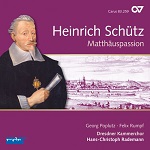
Rival recordings such as Paul Hillier’s (DaCapo – review)
offer just the Matthäus-passion (54:42), so the new Carus, part
of their complete Schütz edition, wins on value for money, especially
as the other works included have no rivals in the UK catalogue.
The setting is austere – don’t expect anything like the Bach Passions
– not entirely from choice: the sparsity is sometimes explained by the
fact that Schütz had very small forces at his disposal because of the
Thirty Years War: though over in 1648, its effect throughout North Germany
lasted for many years after. In any event, Rademann and his forces
make it sound more attractive than any version that I’ve heard, stretching
back to Roger Norrington’s (Argo, 1972) and the recording, even in mp3,
sounds fine. Unless you have a copy of Luther’s Bible to hand, the
lack of texts is deplorable, especially as this is music for devotion
and demanding of the listener’s attention.
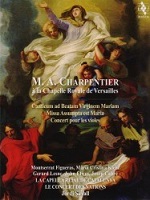 Marc-Antoine
CHARPENTIER (1643-1704)
Marc-Antoine
CHARPENTIER (1643-1704)
Charpentier at the Chapelle Royale de Versailles
La Capella Reial de Catalunya, Le Concert des Nations/Jordi Savall
rec. 1989/2004, Eglise de Notre-Dame du Travail, Paris; Chapelle Royale
de Versailles
ALIA VOX AVDVD9905 [74:50 + 64:06]
On disc this comes as two SACDs plus a DVD – details
and review – but if you’re happy to forego the visual aspect, it
costs much less to download. 7digital.com have it in mp3 and lossless,
but without booklet. If you stream it from Qobuz,
you’ll find the lavish booklet there: plenty of information, in multiple
languages, and illustrations, but NO texts.
What we have is a reissue of the first-ever recording which Jordi Savall
made with La Capella Reial in 1989 – 25 years ago – coupled with a 2004
performance of the Missa Assumpta est Maria. I thoroughly enjoyed
it all.
Marc-Antoine CHARPENTIER (1643-1704)
Leçons de Ténèbres pour le Mercredy Sainct (Tenebræ for
Wednesday in Holy Week) [62:52]
Judith Nelson (soprano); Anne Verkinderen (soprano)
Concerto Vocale/René Jacobs (counter-tenor)
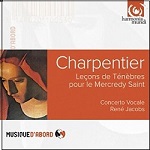 rec.
1978.?
rec.
1978.?
HARMONIA MUNDI MUSIQUE D’ABORD HMA1951005 [62:52] – from eclassical.com
(mp3 and lossless: NO booklet)
The reissue of this recording at budget price is very welcome, as it
is otherwise immured in a 30-disc box set. Its release is timely, too,
with Holy Week looming.
Eclassical.com also have the same performers in Charpentier’s Leçons
de ténèbres for Good Friday, no longer available on CD (HMC901007).
Though the lack of a booklet there is equally deplorable, there’s no
alternative, but the Musique D’Abord reissue is available on CD at budget
price, with at least a semblance of a booklet. I’d like to have it,
though I doubt if it contains the texts: you can, however, find a link
to these in my full review
of this recording.
Agostino STEFFANI (1654-1728) Niobe Regina di Tebe (1687)
Veronique Gens - Niobe, Jacek Laszczkowski - Anfione, Delphine Galou
– Nerea, Iestyn Davies - Creonte, Tim Mead - Clearte, Lothar Odinius
- Tiberino, Amanda Forsythe - Manto, Bruno Taddia - Tiresia), Alastair
Miles - Poliferno
Bathasar Neumann Ensemble/Thomas Hengelbrock
rec. Royal Opera House, Covent Garden, September 2010. DDD
OPUS ARTE ROYAL OPERA HOUSE COLLECTION OACD9008D [2:46:58] –
from classicsonline.com
(mp3, with pdf booklet)
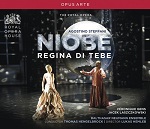 First
we had only excerpts, then, like the proverbial banana-bunch London
buses, two recordings of this opera have come along at once. I plan
to compare this and the new Erato – it’s received high praise in several
quarters – but meanwhile you won’t go far wrong with the Opus Arte.
First
we had only excerpts, then, like the proverbial banana-bunch London
buses, two recordings of this opera have come along at once. I plan
to compare this and the new Erato – it’s received high praise in several
quarters – but meanwhile you won’t go far wrong with the Opus Arte.
John-Pierre Joyce reviewed
the production for our sister site Seen and Heard: ‘[Jacek] Laszczkowski’s
… well-publicised ‘male soprano’ voice [as Anfione] works rather well,
although the transition between middle and upper registers does wobble
occasionally. He is at his best at the top of the scale, and gives an
idea of what the castrato may have sounded like. Veronique Gens as Niobe
is excellent – alternately haughty, seductive and grief-stricken. Her
love duet with Iestyn Davies … is superb. The Balthasar Neumann Ensemble
under Thomas Hengelbrock rejoice in the punchy rhythms and delicate
instrumentation of Steffani’s score’.
Michel-Richard de LALANDE (1657-1726) Leçons de Ténèbres
O Mors [0:29]
Miserere [22:35]
Tristis est anima mea [1:24]
Troisième Leçon du Mercredy [15:45]
Ecce vidimus eum [1:53]
Troisième Leçon du Jeudy [19:44]
Vinea mea electa [1:11]
Troisième Leçon du Vendredy [11:39]
Plange quasi virgo [1:17]
Sophie Karthäuser (soprano)
Ensemble Correspondances/Sébastien Daucé
rec. July 2014, La Courroie, Entraigues-sur-la-Sorgue, France
texts and translations included
HARMONIA MUNDI HMC902206 [75:57] – from eclassical.com
(mp3, 16- and 24-bit lossless, with pdf booklet)
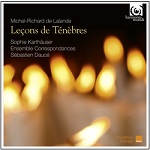 The
practice of setting Tenebræ – see Charpentier (above) – had reached
its apogee by the time of Lalande and François Couperin (below). These
settings call for a voice which combines purity and operatic power:
in the first respect Sophie Karthäuser almost equals Emma Kirkby and
she even excels her in the second. Fortunately, however, we don’t have
to choose between them, since the BIS recording on which Kirkby (BIS-CD-1575
– review)
features is complementary to the new Harmonia Mundi, containing all
three of Couperin’s Lessons for Wednesday, so overlapping with the new
recording only in part. Ensemble Correspondances add the Thursday reading
plus the Psalm Miserere, appointed for Lauds on Good Friday,
and some of the responsories which also formed part of Tenebræ.
The
practice of setting Tenebræ – see Charpentier (above) – had reached
its apogee by the time of Lalande and François Couperin (below). These
settings call for a voice which combines purity and operatic power:
in the first respect Sophie Karthäuser almost equals Emma Kirkby and
she even excels her in the second. Fortunately, however, we don’t have
to choose between them, since the BIS recording on which Kirkby (BIS-CD-1575
– review)
features is complementary to the new Harmonia Mundi, containing all
three of Couperin’s Lessons for Wednesday, so overlapping with the new
recording only in part. Ensemble Correspondances add the Thursday reading
plus the Psalm Miserere, appointed for Lauds on Good Friday,
and some of the responsories which also formed part of Tenebræ.
With excellent instrumental support, very good recording and the provision
of texts and translations, this is an essential purchase, even for those
who already have the BIS recording or Isabelle Desrochers et al
on mid-price Naïve E8913 – review.
One small point: using the Authorised (King James) Version for the English
translation means that it doesn’t exactly accord with the Latin, for
example at the end of third Lesson for Good Friday where the English
text omits the words Recordare Domine quid accedit nobis (Remember,
O Lord, what has befallen us), repeated in Latin from the beginning
of the chapter.
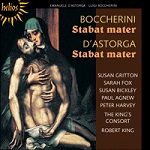 Luigi
BOCCHERINI (1743–1805) Stabat mater, Op.61 (1800 version)
[45:41]
Luigi
BOCCHERINI (1743–1805) Stabat mater, Op.61 (1800 version)
[45:41]
Emanuele d’ASTORGA (1680–?1757) Stabat mater [27:35]
Susan Gritton, Sarah Fox (soprano); Susan Bickley (mezzo); Paul Agnew
(tenor); Peter Harvey (bass)
The King’s Consort/Robert King
rec. St Jude on the Hill, Hampstead Garden Suburb, London, 22-24 February
1999. DDD
Texts and translations included
HYPERION Helios CDH55287 [73:19] – from hyperion-records.co.uk
(mp3 and lossless, with pdf booklet)
This was an urgent recommendation when first issued – please see 5+5-star
review
of original release on CDA67108 – now, in the super-budget category,
reissued just in time for Good Friday, it’s an irresistible bargain
too.
Georg Philipp TELEMANN (1681-1767) Overtures and Concertos for Darmstadt
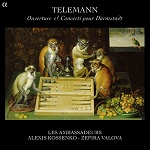 Overture
(Suite) in F, TWV 55:F3 [24:06]
Overture
(Suite) in F, TWV 55:F3 [24:06]
Violin Concerto in a minor, TWV 51:a1 [7:16]
Flute Concerto in D, TWV 51:D1 [16:15]
Concerto for Flute and Violin in e Minor, TWV 52:e3 [9:24]
Flute Concerto in D, TWV 51:D2 [12:49]
Les Ambassadeurs/Alexis Kossenko
ALPHA 200 [70:23] – from classicsonline.com
(mp3, with pdf booklet) or stream from Naxos
Music Library
Avoiding duplication in Telemann’s music is well-night impossible but
none of the music here seems to overlap with other recordings of collections
of his Darmstadt works on Naxos or Teldec.
The stylish and well-paced performances sound very well and the provision
of the booklet is an added bonus.
George Frideric HANDEL (1685-1759)
Joshua, Oratorio in three acts, HWV64 (1747/8)
Kenneth Tarver (tenor) - Joshua
Tobias Berndt (baritone) - Caleb
Renata Pokupic (mezzo) - Othniel
Anna Dennis (soprano) - Achsah
NDR Choir
Göttingen Festival Orchestra/Laurence Cummings
rec. live 29 May 2014, Stadthalle, Göttingen, Germany DDD.
Text included.
ACCENT ACC26403 [47:45 + 68:05] – from classicsonline.com
(mp3, with pdf booklet)
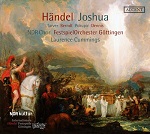 There’s
tough competition from Emma Kirkby, James Bowman and the King’s Consort
on Hyperion CDA66461/2 – December
2009 DL Roundup – and for those looking for the 1748 original, Laurence
Cummings again, with the London Handel Festival performers on SOMM2402
– download from
theclassicalshop.net (mp3 and lossless, NO booklet) or classicsonline.com
(mp3, with pdf booklet). I was a little less impressed with the K&K
recording – review.
There’s
tough competition from Emma Kirkby, James Bowman and the King’s Consort
on Hyperion CDA66461/2 – December
2009 DL Roundup – and for those looking for the 1748 original, Laurence
Cummings again, with the London Handel Festival performers on SOMM2402
– download from
theclassicalshop.net (mp3 and lossless, NO booklet) or classicsonline.com
(mp3, with pdf booklet). I was a little less impressed with the K&K
recording – review.
All these, including the present release, make a good case for a work
which is somewhat neglected because it’s seen as too closely linked
to the politics of the late 1740s and the putting down of the Stuart
threat. Despite the popularity of individual numbers such as O had
I Jubal’s Lyre and See the conquering Hero comes! – added
to Judas Maccabæus and repeated in Joshua – the oratorio
as a whole is not much performed. Professor Wolfgang Sandberger points
out its strengths in the Accent booklet but the new performance presents
an even more eloquent argument in its favour. The singing of all four
soloists is good and, though not all are Anglophone, diction presents
no problems. Credit goes to the choir and orchestra, too, but most
of all to Laurence Cummings, now a pluralist in this work, whose tempi
are very well judged.
With good recording and a fine booklet, personal choice, perhaps determined
by the retention of (brief) applause on Accent, may safely be your guide
among the three versions.
Louis-Nicolas CLÉRAMBAULT (1676-1749) Psalm 50 (51) Miserere
[24:54]
François COUPERIN (1688-1733) Trois Leçons De Ténèbres du
premier Jour [39:34]
Le Poème Harmonique
rec. 10-17 November and 17-20 November 2013, Chapelle Royale du Château
de Versailles
Texts and translations included
ALPHA ALPHA957 [64:28] – from eclassical.com
(mp3, 16- and 24-bit lossless, with pdf booklet)
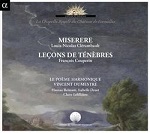 Both
works were composed for the elaborate Holy Week ceremonies in early
18th-century France. Psalm 50 (51) was prescribed for Lauds
on Good Friday and the Tenebræ settings contain the readings
from the book of Lamentations, prescribed for Matins on the Thursday,
Friday and Saturday before Easter, celebrated with elaborate and dramatic
ritual on the previous evening. The only extant settings by Couperin,
recorded here, are for Maundy Thursday, celebrated on the Wednesday
evening. If you bought the wonderful bargain Decca Baroque Era
50-CD set or the second volume of it as a download – DL
News 2014/10 – you need look no further for the Couperin than the
performances by Emma Kirkby and Judith Nelson there, with his Easter
Motet. (Also available separately for £3.96 from 7digital.com).
Both
works were composed for the elaborate Holy Week ceremonies in early
18th-century France. Psalm 50 (51) was prescribed for Lauds
on Good Friday and the Tenebræ settings contain the readings
from the book of Lamentations, prescribed for Matins on the Thursday,
Friday and Saturday before Easter, celebrated with elaborate and dramatic
ritual on the previous evening. The only extant settings by Couperin,
recorded here, are for Maundy Thursday, celebrated on the Wednesday
evening. If you bought the wonderful bargain Decca Baroque Era
50-CD set or the second volume of it as a download – DL
News 2014/10 – you need look no further for the Couperin than the
performances by Emma Kirkby and Judith Nelson there, with his Easter
Motet. (Also available separately for £3.96 from 7digital.com).
I marginally prefer the performances of the Couperin by Kirkby and Nelson
and those by Michael Chance and James Bowman on budget-price Hyperion
Helios (CDH55455 – from hyperion-records.co.uk,
mp3 and lossless, with booklet) and by Sophie Daneman and Patricia Petibon
on Erato 0630170672, both reviewed in DL
Roundup April 2012/1, but the Alpha is very good, too, and is well
worth having for the Clérambault Miserere, a fine piece otherwise
available only on a Virgin/Erato 5-CD set.
Carl Philipp Emanuel BACH (1714-1788) Symphonies
Orchester-Sinfonie in D, Wq.183/1 (H663) [10:39]
Sinfonie in A, Wq.182/4 (H660) [12:10]
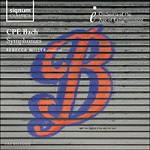 Sinfonie
in b Minor, Wq.182/5 (H661) [10:44]
Sinfonie
in b Minor, Wq.182/5 (H661) [10:44]
Orchester-Sinfonie in F, Wq.183/3 (H665) [10:35]
Sinfonia in E-flat, Wq.179 (H654) [12:25]
Orchestra of the Age of Enlightenment/Rebecca Miller
rec. Queen Elizabeth Hall, London, January 2014. DDD
SIGNUM SIGCD395 [56:33] – from hyperion-records.co.uk
(mp3, 16- and 24-bit lossless, with pdf booklet).
This is slightly late for CPE’s tercentenary year, but better late than
never, especially as no current recording offers exactly this programme.
I can’t do better than to agree with Simon Thompson’s summing up: ‘This
is a well curated and very well played disc. [It] furnishes an excellent
introduction to the composer’s brilliantly original orchestral music’.
Please see his full review.
Ludwig van BEETHOVEN (1770-1827)
Piano Sonata No.30 in E, Op.109 [18:33]
Piano Sonata No.31 in A flat, Op.110 [19:03]
Piano Sonata No. 32 in c minor, Op.111 [26:49]
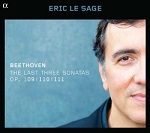 Eric
Le Sage (piano)
Eric
Le Sage (piano)
rec. 2-10 January 2012, Philharmonic Concert Hall, Liège, Belgium
ALPHA 607 [64:25] – from classicsonline.com
(mp3, with pdf booklet)
Please see review
by Brian Reinhart.
This wouldn’t be my first choice for these sonatas – among many possible
candidates that would have to be Wilhelm Kempff on a budget-price DG
twofer, E4530102 – but it is certainly well worth considering.
I listened only to a less than ideal 192kb/s press preview from Outhere,
who really should be offering reviewers something better to judge by,
but even in that form it sounds fine.
Franz (Ferenc) LISZT (1811-1886)
Sonata
in b minor, S178 (1857) [34:19]
Sonetto di Petrarca No.47 (Années de pèlerinage: Italie,
S161. No.4) (1846) [6:24]
Sonetto di Petrarca No.104 (Années de pèlerinage: Italie,
S161, No.5) (1846) [7:35]
Sonetto di Petrarca No.123 (Années de pèlerinage: Italie,
S161, No.6) (1846) [7:58]
Après une lecture du Dante - Fantasia quasi Sonata (Années
de pèlerinage: Italie, S161, No.7) (1846) [18:15]
Angela Hewitt (piano)
rec. Jesus-Christus-Kirche, Berlin, Germany, May 2014. DDD
HYPERION CDA68067 [74:31] – from hyperion-records.co.uk
(mp3, 16- and 24-bit lossless, with pdf booklet)
Sonata in b minor, S178 (1857) [29:52]
Sonetto di Petrarca No.47 (Années de pèlerinage: Italie,
S161. No.4) (1846) [5:51]
Sonetto di Petrarca No.104 (Années de pèlerinage: Italie,
S161, No.5) (1846) [6:28]
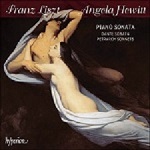
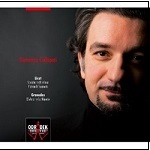 Sonetto
di Petrarca No.123 (Années de pèlerinage: Italie, S161,
No.6) (1846) [7:04]
Sonetto
di Petrarca No.123 (Années de pèlerinage: Italie, S161,
No.6) (1846) [7:04]
Enrique GRANADOS (1867-1916)
El Amor y la Muerte from Goyescas [12:52]
Domenico Codispoti (piano)
rec. Studio Odradek, December 2011. DDD
ODRADEK ODRCD303 [62:10] – from amazon.co.uk
(NO booklet)
If your anticipation was whetted by my trailer for Angela Hewitt’s recording
on Hyperion in the last DL News, you can now read Geoffrey Molyneux’s
full review here
together with that of Domenico Codispoti’s very decent but outclassed
alternative.
The Art of Rafael Kubelík
Alexander BORODIN (1833-1887) Symphony No.2 in b minor* [27:17]
from ASD422, released 1961.
Leos JANÁČEK (1854-1928) Taras Bulba [21:50]
first released as ALP1675
Antonín DVOŘÁK (1941-1904) Slavonic Rhapsody No.3
in A flat, Op.45/3 [11:46]
first released as ALP1769
Vienna Philharmonic Orchestra*
Royal Philharmonic Orchestra/Rafael Kubelík
rec. 1958/59. ADD stereo.
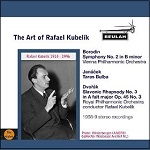 BEULAH
1PDR8 [60:54] – from amazon.co.uk
(mp3) or iTunes
(m4a)
BEULAH
1PDR8 [60:54] – from amazon.co.uk
(mp3) or iTunes
(m4a)
Borodin’s music is tuneful and colourful and nowhere more so than in
this symphony but Kubelík’s performance reminds us more than any other
recording that I know that there’s more to it than sheer exuberance.
Though you wouldn’t mistake the recording for the very latest sound
– not quite all of the then distinctive sound of the VPO is captured
in this transfer – it’s very acceptable.
Kubelík’s Taras Bulba combines lyricism and energy in ideal amounts
and it goes without saying that the little-known Dvořák Rhapsody
is every bit as good as I expected from a conductor whose New World
is still one of my top recommendations. Though these two works were
first released in mono, the recording and transfer sound fine.
Georges BIZET (1838-1875)
Marche funèbre in b minor (1860-61) [8:25]
Overture in A (c.1855) [12:39]
Patrie – Overture, Op.19 (1873) [12:18]
Esquisse: Les quatre coins (1871) [3:02]
Petite suite, Op. 22 (1871) [10:50]
Roma – Symphony (1860-68, rev. 1871) [31:11]
RTÉ National Symphony Orchestra/Jean-Luc Tingaud
rec. National Concert Hall, Dublin, Ireland, 6-8 January, 2014. DDD
NAXOS 8.573344 [78:24]
Reviewed as 2xHD/NAXOS 812864019858 – from eclassical.com
(mp3, 16- and 24-bit lossless, with pdf booklet).
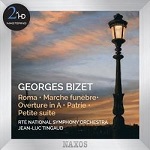
Bizet struggled for over a decade before abandoning work on Roma.
I hadn’t heard the work in its entirety before I reviewed Paavo Järvi’s
recording on Virgin – review
– and I have to say that I still think Bizet was correct to abandon
it. In any case, I found the Symphony in C and Jeux d’Enfants
on that recording somewhat disappointing. Nor did Jean-Luc Tingaud
persuade me of the work’s qualities, though I enjoyed his performances
of the other works.
When the Naxos in mp3 is available for £4.99 from classicsonline.com
and in 16-bit lossless for £5.99 from COL
HD:LL, the question has to be if it’s worth paying $21.17 for the
24-bit version from eclassical.com, especially as it’s an exceptionally
large file to download, clocking in at 2.7GB: unusually, it’s not 24/96
but 24/192. I’m sorry to say that my answer must be no: the sound is
disappointingly rather muddy, so I’d stick with the mp3 or 16-bit.
John Knowles PAINE (1839-1906)
Symphony No. 2 in A, Op.34, ‘In the Spring’ (1879) [47:58]
Oedipus Tyrannus, Op.35: Prelude (1880-1881) [7:52]
Poseidon and Amphitrite, An Ocean Fantasy, Op.44 (c.1888) [12:14]
Ulster Orchestra/JoAnn Falletta
rec. 1-2 March 2014, Ulster Hall, Belfast, Northern Ireland
Pdf booklet included
NAXOS AMERICAN CLASSICS 8.559748 [68:04] – from eclassical.com
(mp3, 16- & 24-bit lossless)
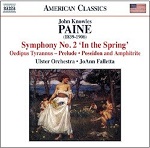 This
is one of my occasional Innocent Ear reviews; well, I have heard
the first volume in this series, the CD of which met with Rob Maynard’s
approval in December 2013 (review).
Alas, while I found it mildly diverting I can’t say it made a lasting
impression on me. Paine, who received some of his musical training in
Germany between 1858 and 1861, brought back with him a compositional
style that’s clearly European. The Second Symphony, with its seasonal
programme, strikes me as rather frumpy and foursquare, and its textures
seems more than a little threadbare.
This
is one of my occasional Innocent Ear reviews; well, I have heard
the first volume in this series, the CD of which met with Rob Maynard’s
approval in December 2013 (review).
Alas, while I found it mildly diverting I can’t say it made a lasting
impression on me. Paine, who received some of his musical training in
Germany between 1858 and 1861, brought back with him a compositional
style that’s clearly European. The Second Symphony, with its seasonal
programme, strikes me as rather frumpy and foursquare, and its textures
seems more than a little threadbare.
The fillers, Paine’s prelude to a Harvard production of Sophocles’ Oedipus
Tyrannus and the ‘ocean fantasy’ Poseidon and Amphitrite,
aren’t particularly memorable either. As played here the former is frankly
overblown, and the latter, while possessed of a certain charm, is crude
and rhetorical. Falletta, whose Buffalo Philharmonic recordings have
impressed me a great deal over the years, is cast adrift here. Her brief
tenure with the troubled Ulster Orchestra was cut short in 2014; on
the evidence of these scrappy, sub-par performances it’s not difficult
to see why she went home early.
I reviewed the 24/96 flacs and I have to say the sound is significantly
below Naxos’s best; it’s rough, shallow and fatiguing, not at all what
you’d expect from a high-res recording. If you must have this album,
don’t waste your money on the lossless versions; the mp3s will suffice.
Musically unadventurous and technically unappealing; of curiosity value
only.
Dan Morgan
Pictures - Music for 8 Horns and Percussion
Modest MUSSORGSKY (1839-1881)
Pictures at an Exhibition (arr. Stephan Schottstätt) [21:53]
Night on Bald Mountain (arr. Georg Köhler) [11:42]
Dmitri SHOSTAKOVICH (1906-1975)
Suite for Variety Orchestra - Waltz and Dance (arr. Christoph Eß) [6:52]
Sergei PROKOFIEV (1891-1953)
Romeo and Juliet, Op.64 - excerpts (arr. Stephan Schottstätt)
[18:28]
Piotr Il’yich TCHAIKOVSKY (1840-1893)
The Nutcracker - excerpts from Suite Op.71a (arr. Ralph Ficker)
[15:12]
The German Hornsound (Christoph Eß, Sebastian Schorr, Stephan Schottstätt,
Timo Steininger) with Carsten Duffin, Ralph Ficker, Martin Grom and
Christian Lampert (horns), Simon Rössler (percussion and keyboards),
Hannes Krämer (conductor)
rec. 17-19 April 2014, Studio of the Württembergische Philharmonie Reutlingen,
Germany
Pdf booklet included
GENUIN CLASSICS GEN15340 [74:39] – from eclassical.com
(mp3, 16- and 24-bit lossless)
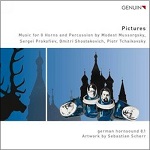 In
his CD review
Nick Barnard dubbed this a ‘thrillingly brilliant disc’, and on first
acquaintance with the 24/44.1 download I’m inclined to agree. With the
exception of Night on a Bare Mountain these arrangements are
by members of the group; in the main they’re well crafted, well played
and well recorded, although I do miss the frisson-inducing ballast
that a full orchestra provides.
In
his CD review
Nick Barnard dubbed this a ‘thrillingly brilliant disc’, and on first
acquaintance with the 24/44.1 download I’m inclined to agree. With the
exception of Night on a Bare Mountain these arrangements are
by members of the group; in the main they’re well crafted, well played
and well recorded, although I do miss the frisson-inducing ballast
that a full orchestra provides.
That’s the upside; the downside is that the tracks/works are jumbled
up. For example the first two tracks contain Promenade and Gnomus
from Pictures, while track 3 is devoted to Night on a Bald
Mountain. We then switch to two more Pictures, and the Shostakovich
suite; that’s followed by another three Pictures and the Prokofiev.
Nick didn’t find that a problem but I did. The idea is to offer maximum
contrast between tracks, but that just spoilt my enjoyment of this otherwise
entertaining album. At least with a download you can rearrange the tracks
in some kind of order; that said, if the higgledy-piggledy aspect of
this recording doesn’t bother you, just kick back and enjoy the music-making.
Fine playing and imaginative arrangements; the odd presentation is a
matter of taste, though.
Dan Morgan
Sir Edward ELGAR (1857-1934)
Scenes from the Saga of King Olaf, Op.30 (1896) [94:55]
The Banner of Saint George, Op.33 (1897) [27:15]
Emily Birsan (soprano); Barry Banks (tenor); Alan Opie (baritone)
Bergen Philharmonic Choir; Choir of Collegiûm Mûsicûm; Edvard Grieg
Kor
Bergen Philharmonic Orchestra/Sir Andrew Davis
rec. June 2014, Grieghallen, Bergen, Norway. DDD/DSD
English texts included
CHANDOS CHAN5149 [53:18 + 59:07] – from theclassicalshop.net
(mp3, 16- and 24-bit lossless and surround sound, with booklet). Also
available as SACD.
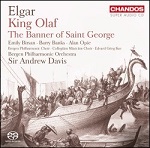 See
review
of SACD CHSA5149 by John Quinn (‘you must hear this new recording’)
and John France (‘I cannot fail to be impressed with Elgar’s ability
to write engaging music for these prosaic texts’).
See
review
of SACD CHSA5149 by John Quinn (‘you must hear this new recording’)
and John France (‘I cannot fail to be impressed with Elgar’s ability
to write engaging music for these prosaic texts’).
Set aside any prejudice against Longfellow’s cod Old Norse and just
enjoy the music. It’s no worse than the piano score of Die Walküre
from which I followed that opera the first time that I heard it where
Sieglinde’s opening words (Ein fremder Mann. Ihn muß ich fragen.)
became ‘A stranger here; I must accost him’* or the translation of Beowulf
where the hero’s ship, flota fami-heals, fugle gelicost, is rendered
‘the foamy-necked floater most like to a fowl’.
Vernon Handley’s recording of King Olaf to which John Quinn refers,
though deleted on CD, can be found as a download or streamed from Qobuz
(with The Black Knight, conducted by Charles Groves). It appeared
in 1987, so it’s DDD, but it sounds a little recessed, at least as heard
in streamed format from Qobuz; turning to the new Chandos, heard in
the 24/96 download version, is like transferring from an old VHS recording
to a modern blu-ray.
* Andrew Porter’s ‘where has he come from?’ may be less literal but
it doesn’t destroy the mood with suggestions of prostitution.
Sir Edward ELGAR (1857-1934)
Sea Pictures, Op.37 [21:46]
The Dream of Gerontius, Op.38 [111:55]
Sarah Connolly (mezzo); Stuart Skelton (tenor); David Soar (bass)
BBC Symphony Chorus;
BBC Symphony Orchestra/Sir Andrew Davis
rec. Fairfield Halls, Croydon, 3-5 April 2014. DDD/DSD
CHANDOS CHAN5140 [58:20 + 65:21] – from theclassicalshop.net
(mp3, 16- and 24-bit lossless and surround sound, with pdf booklet).
Also available on SACD as CHSA5140 – review:
Recording of the Month.
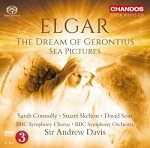 From
the very first bars of the Prelude it is abundantly clear that
we are in for a performance of The Dream of Gerontius to remember.
The commitment of the conductor is apparent right from the start as
we hear the muted violas, clarinets and bassoons in unison intone the
opening motif of Elgar’s great work. The BBC Symphony Orchestra play
magnificently as we hear some of the main themes unfolding. Andrew Davis
has complete control of the varying moods, tempi and rubato in
this work, and the Chandos recording vividly portrays the colours and
wide variety of dynamics required.
From
the very first bars of the Prelude it is abundantly clear that
we are in for a performance of The Dream of Gerontius to remember.
The commitment of the conductor is apparent right from the start as
we hear the muted violas, clarinets and bassoons in unison intone the
opening motif of Elgar’s great work. The BBC Symphony Orchestra play
magnificently as we hear some of the main themes unfolding. Andrew Davis
has complete control of the varying moods, tempi and rubato in
this work, and the Chandos recording vividly portrays the colours and
wide variety of dynamics required.
The performance continues in this vein and it is as though Davis has
a vision of the entire work right from the beginning. The BBC Symphony
Chorus is admirable throughout and once again we are aware of the quality
of their singing from their first entry at Kyrie eleison, breathtakingly
soft and even-toned. Their attack at Rescue him and the subsequent
build-up as the different voices enter is stunning. The ensuing phrasing,
the shaping of the syllables and the clarity of diction from the chorus
at Noe, from the waters...is spine-tingling. The Chorus is nothing
less than wonderful at Praise to the Holiest, a great, climactic
moment in the work and there is a thrilling Demons’ Chorus, all
superbly captured by Chandos.
Stuart Skelton as Gerontius brings his characteristic sound to
the role, rather different from others in this music to whom we are
accustomed. He delivers the role with great clarity, musicality, understanding
and a feeling for Newman’s text. I particularly liked his soft singing
at his first entry and at I can, no more, for now..... He is
also good in Sanctus fortis, though I fear not quite up to the
greats in this role, such as Peter Pears and Heddle Nash. As the Soul
of Gerontius in Part 2, his sweet toned nuances seem nigh on perfect.
I have come to admire him so much in the opera house recently but it
is also good to know that we have such a fine Gerontius performing
today. I certainly prefer his account to that of Richard Lewis for Barbirolli
on EMI Classics. Lewis is hugely dramatic and although his Sanctus
fortis is very good, he sometimes scoops up to his notes in Part
1 and his voice can sound strained.
Lewis is in much better voice in Part 2, but I find Skelton altogether
preferable. Peter Pears was unforgettable in this role, and for my money,
the most musical and dramatic Gerontius of all. Fortunately his interpretation
was captured by Decca in 1971 when he was still at the height of his
powers. Benjamin Britten conducts a fresh, insightful account and there
is the added bonuses of the magnificent John Shirley-Quirk in the baritone
roles and Yvonne Minton who is very fine as a The Angel.
On Chandos, David Soar gives an excellent performance as the priest,
full-toned and appropriately majestic. He gives a very moving account.
As the Chorus enters at Go in the name... the Chandos engineers
provide a full-bodied acoustic for this climax in Part 1. When the priest
joins the chorus and semi-chorus, the clarity of the moving parts is
superbly captured. David Soar gives a soulful interpretation of The
Angel of the Agony in Part 2.
As well as the overall conception of the work, understood with great
mastery by Andrew Davis, there are many more notable, individual moments
in the performance. Andrew Davis’s and the orchestra’s thrilling build
up to the moment of Judgement, and Stuart Skelton’s impassioned plea
at Take me away... are just two more unforgettable passages in
this recording.
The BBC Symphony Orchestra provide a veiled and hushed sound for the
Introduction to Part 2 in preparation for the appearance of the Soul
of Gerontius and for Sarah Connolly’s The Angel.
Having grown up with Janet Baker’s great and unsurpassed portrayal in
the role, I was quite surprised to discover much similarity in their
interpretations, phrasing and tone-colours. I certainly appreciated
Connolly’s musicianship and her seemingly natural feel for this music.
She is certainly up there with best interpreters of this role though
I am not keen on her sometimes excessive vibrato.
The chorus is always magnificent. I have seldom heard such clarity of
diction, for example at Low-born clods..., and even more so as
the music becomes increasingly contrapuntal at Dispossessed aside
thrust when the orchestra also has its own independent music. The
range of dynamics in the chorus from very soft to very loud is thoroughly
captured, and the singing is always musically phrased, even in the tiniest
pianissimo fragments such as Ha-ha towards the end of
this section.
Sarah Connolly gives one of the finest accounts of Sea Pictures I
have heard. Comparison with Janet Baker is again inevitable, and again
their musical approaches seem similar. Even their sound, especially
in the higher registers, is comparable. In the first song, Sea Slumber-Song,
I prefer the balance achieved by Barbirolli and his engineers for
Baker and there is some deliciously played woodwind accompanying phrases
from the London Symphony Orchestra. Maybe Connolly could come through
the texture a bit more in places. However, the balance is perfect in
the Chandos in In Haven where some very detailed listening is
possible. This song is beautifully performed by Connolly, and in Sabbath
Morning at Sea she sings with grandeur and quiet sensitivity as
appropriate. She takes Where Corals Lie noticeably quicker than
Baker and I felt that there is a bit too much vibrato now and then in
this and in the final song, The Swimmer. However, this final
song is energetically performed with a sense of drama.
Chandos have provided a truly wonderful recording for both works, probably
the best ever given to The Dream of Gerontius.
Geoffrey Molyneux
My apologies to Geoff and all of you: this should have appeared in DL
News 2015/2 but got ‘lost’ in my muddled system. Gerontius is
my Achilles heel among Elgar’s works – none of the classic recordings
have ever persuaded me to like it. Maybe this new recording will.
I’ll let you know if it does. BW.
Richard STRAUSS (1864-1949)
Don Juan, Op.20. TrV156 [18:36]
Ein Heldenleben, Op.40, TrV190 [46:15]
Symphonieorchester des Bayerischen Rundfunks/Mariss Jansons
rec. live, Herkulessaal der Residenz, Munich, 24-28 February 2014 (Don
Juan), Philharmonie im Gasteig, 14-18 March 2011 (Heldenleben)
BR-KLASSIK 900127 [64:51] – from eclassical.com
(mp3 and lossless, with pdf booklet) or stream from Qobuz.
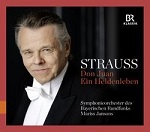
We already had more than enough fine recordings of these works – 11
of each listed in MusicWeb-International
Recommends – but the new live recording from the Bavarian Radio
Symphony Orchestra and Mariss Jansons (applause retained) strongly rivals
the same coupling from Bernard Haitink and the LPO (LPO0079 –
review,
no applause) and does so in (very good) more modern sound (2014 and
2011 respectively). Either recording would make a good choice for
those looking for the coupling – more generous than the RCO recording
of Jansons with the Concertgebouw, which offers just Ein Heldenleben.
Don’t overlook the classic Rudolf Kempe recordings of both works, with
Also sprach Zarathustra, Till Eulenspiegel, Tod und
Verklärung and orchestral extracts from Der Rosenkavalier and
Salome (budget-price Warner/EMI 6783122, 2 CDs – DL
News 2013/2 – or 4317802, 9 CDs).
Carl NIELSEN (1865-1931)
Symphony No. 1 in g minor, Op.7 (1891-1892) [33:50]
Symphony No. 3, Op. 27 Sinfonia espansiva (1910-1911) [37:48]
Royal Stockholm Philharmonic Orchestra/Sakari Oramo
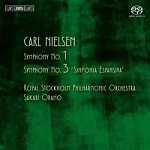 rec.
2013/14, Stockholm Concert Hall, Sweden
rec.
2013/14, Stockholm Concert Hall, Sweden
Pdf booklet included
BIS BIS-SACD-2048 [72:28] – from eclassical.com
(mp3, 16- and 24-bit lossless)
Having been disappointed with the first release in this series, Dan
Morgan made this follow-up his Recording of the Month
–
review. Herbert Blomstedt with the SFSO (Double Decca 4609852,
Symphonies 1-3, Maskarade and Aladdin Overtures) remains
very well worth considering for bargain hunters but the new Oramo will
be my and most listeners’ first choice for the coupling of Nos. 1 and
3.
Dan reviewed the 24-bit version so I tried the 16-bit lossless, which
sounds very well and can be yours for the very reasonable price of $10.86.
Paul DUKAS (1865-1935)
L’Apprenti Sorcier (The Sorcerer’s Apprentice) [10:52]
La Péri - Fanfare and Poème Dansé [20:03]
Symphony in C [40:51]
RTÉ National Symphony Orchestra/Jean-Luc Tingaud
rec. National Concert Hall, Dublin, 7-10 October 2013
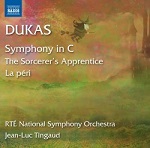 NAXOS
8.573296 [71:46] – stream or download from Qobuz
(16- and 24-bit lossless, with pdf booklet)
NAXOS
8.573296 [71:46] – stream or download from Qobuz
(16- and 24-bit lossless, with pdf booklet)
See review
by John Whitmore: ‘This CD gives us first rate performances
of La Péri and the Symphony. The performance of The
Sorcerer’s Apprentice is good, despite my reservations, so overall
this is a fine addition to the Dukas discography’ and review
by James L Zychowicz): ‘The fine playing of the RTÉ National
Symphony Orchestra is supported well by admirable engineering. Those
who are unfamiliar with Tingaud’s work will find an outstanding introduction
to it in this disc: a major new conductor.’
The slightly undernourished start of L’Apprenti Sorcier was my
only disappointment. At £4.79 for 16-bit lossless, Qobuz are currently
the least expensive source for Naxos downloads.
British Classics
Ralph VAUGHAN WILLIAMS (1872 – 1958)
English
Folk Song Suite (1923) [10:51]
Gustav HOLST (1874 – 1934)
First
Suite for Military Band, Op. 28/1 (1909) [11:16]
Second Suite for Military Band, Op. 28/2 (1911) [11:36]
Percy Aldridge GRAINGER (1882 – 1961)
Lincolnshire Posy (1937) [16:09]
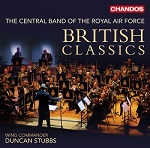 Ernest
TOMLINSON (b. 1924)
Ernest
TOMLINSON (b. 1924)
Suite of English Folk Dances (1951, arr. composer 1999) [13:52]
Gordon LANGFORD (b. 1930)
Rhapsody for Trombone and Brass Band (1975) [12:48]
SAC Jonathan Hill (trombone)
The Central Band of the Royal Air Force/Wing Commander Duncan Stubbs
rec. RAF Music Studios, Northolt, London, 2014
CHANDOS CHAN10847 [77:07] – from theclassicalshop.net
(mp3, 16- and 24-bit lossless, with pdf booklet)
My first choice for this repertoire remains Denis Wicks (ASV, download
only) but the new Chandos makes a very acceptable substitute, minor
reservations notwithstanding. Please see my full review.
American Military Music
Leon ARNAUD Charge; Drummer Boys; Bugler’s Dream; Fifes and Drums;
Bagpipes and Drums
Patrick GILMORE When Johnny comes marching home
Frank MEACHAM American Patrol
Edwin Frank GOLDMAN On the Mall*
John Philip SOUSA Hands across the Sea*; US Field Artillery March;
Stars and Stripes forever; Semper Fidelis; El Capitan;
Washington Post
Francis Saltus van BOSKERCK Semper Paratus
Charles ZIMMERMAN Anchors aweigh
Albert MANCINI US Marines on Parade
Edwin BAGLEY National Emblem
Robert CRAWFORD US Air Force Song
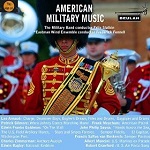 The
Military Band/Felix Slatkin
The
Military Band/Felix Slatkin
* Eastman Wind Ensemble/Frederick Fennell
BEULAH 1PDR7 [70:27] – from amazon.co.uk
(mp3)
Beulah have made a speciality of British and American military music
– link.
I’ve reviewed several of their reissues of music by Sousa and others
directed by Frederick Fennell. There are two items only from Sousa
here but if you enjoy these, you will probably also like Beulah’s three
albums of American Wind Band Classics, again recorded with his Eastman
players.
The other items receive equally idiomatic performances with Felix Slatkin
in command – if anything, they are more exciting and the recordings,
from Capitol, c.1959, have been equally well transferred. I should
add that, the Sousa marches apart, many of the contents are more of
military than of musical interest but I enjoyed hearing the programme.
Serge RACHMANINOV (1873–1943)
All-night Vigil (Vespers), Op.37 (1915)
Bryan Taylor, Paul Davidson, Toby Vaughn Kidd, Joseph Warner (bass)
Julia Scozzafava (mezzo-soprano)
Frank Fleschner, Bryan Pinkall (tenor)
Phoenix Chorale; Kansas City Chorale/Charles Bruffy
rec. Cathedral of St Peter the Apostle, Kansas City, Kansas, USA; 24-26
May 2014. DDD/DSD
Russian text (Cyrilic) and translation included.
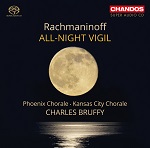 CHANDOS
CHAN5148 [75:34] - from theclassicalshop.net
(mp3, 16- and 24-bit lossless and surround-sound, with pdf booklet).
Also available as CHSA5148 (SACD)
CHANDOS
CHAN5148 [75:34] - from theclassicalshop.net
(mp3, 16- and 24-bit lossless and surround-sound, with pdf booklet).
Also available as CHSA5148 (SACD)
Hyperion have proved that you don’t have to be Russian to perform the
All-Night Vigil successfully: their recording with the Corydon
Singers and Matthew Best is deservedly one of their 30th
Anniversary specials (CDA30016)
and it demonstrates that you don’t have to adopt ponderous tempi, taking
65 minutes overall against 75 on the new recording. Paul Hillier with
the Estonian Chamber Choir is even more expeditious, taking 54 minutes
overall (Harmonia Mundi HMU807504) but that may be one of the
reasons why Kevin Sutton found his recording lacking in spiritual depth
– review
of earlier release).
The new recording has received the highest praise in some quarters and
I enjoyed hearing it, but, unless you must have SACD or 24-bit sound
I’d stay with the Hyperion recording.
Josef SUK (1874-1935)
String Quartet No.1 in B-flat, Op.11 [29:24]
Quartet movement in B-flat [8:47]
String Quartet No. 2, Op.31 [30:05]
Piano Quintet in g minor, Op.8 [35:24]
Suite, Op.21: II. Minuet (version for string quartet) [3:12]
Ballade in d minor (version for string quartet) [6:24]
String Quartet in d minor: II. Barcarolle (1923 version) [3:05]
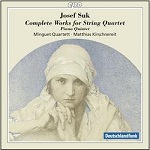 Meditation
on old Bohemian Chorale St. Wenceslas, Op.35a [8:16]
Meditation
on old Bohemian Chorale St. Wenceslas, Op.35a [8:16]
Minguet Quartet; Matthias Kirschnereit (piano)
rec. 1-4 November 2010; 23-24 May 2011, 23-25 February 2012. DDD
Venue not stated
CPO 777652-2 [124:37] – from eclassical.com
(mp3 and lossless, with pdf booklet)
My benchmark version for these works by Dvorak’s son-in-law is now sounding
a little elderly: String Quartets Nos. 1 and 2, Quartet Movement in
B-flat, String Quartet No.2, Tempo di Menuetto, Meditation on
St Wenceslas: Supraphon 1115312: Suk Quartet [71:20] –
from emusic.com
(mp3, no booklet). The new recordings make an idiomatic replacement,
with the added bonus of the Piano Quintet and more modern sound, especially
in the lossless version.
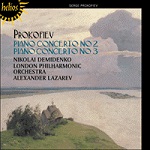 Sergei
PROKOFIEV (1891–1953)
Sergei
PROKOFIEV (1891–1953)
Piano Concerto No.2 in g minor, Op.16 [35:30]
Piano Concerto No.3 in C, Op.26 [28:54]
Nikolai Demidenko (piano)
London Philharmonic Orchestra/Alexander Lazarev
rec. Blackheath Concert Halls, London, 19-20 December 1995. DDD
HYPERION HELIOS CDH55440 [64:24] – from hyperion-records.co.uk
(mp3 and lossless, with pdf booklet)
Comparative versions:
• Nos.1-5: Chandos CHAN10802 (2 CDs) Jean-Efflam Bavouzet; BBC
Philharmonic/Gianandrea Noseda –
review and DL
News 2014/1
• Nos.1-5: Chandos CHAN10522 (2 CDs, budget price) Horacio Gutiérrez
(Nos. 2 and 3) Boris Berman (remainder); Concertgebouw/Neeme Järvi –
see DL
News 2012/22
• Nos. 2 and 3: BIS- Freddy Kempf; Bergen PO/Andrew Litton – see
DL
News 2012/22
• No.2: Naxos 8.550565 Kim Woo Paik; Polish NRSO/Antoni Wit (with
No.5)
• No.3: Naxos 8.550566 Kim Woo Paik; Polish NRSO/Antoni Wit (with
Nos.1, 3 and 4)
• No.3: DG Originals 4474382 Martha Argerich; BPO/Claudio Abbado
(with Ravel Concerto, Gaspard)* More of my colleagues chose this
than any other version for MWI
Recommends.
• No.3: EMI 2285312 Martha Argerich; Charles Dutoit (with No.1
and Bartók No.3)*
*see DL
News 2014/1
Demidenko’s recording of these two concertos met with some mixed reviews
when it first appeared, with praise in some quarters and reservations
in others. I’ve listened to, liked and commented on all those listed
as comparative recordings at different times but I enjoyed Demidenko
and Lazarev in both these concertos and could be very happy to have
their recordings as my sole versions. They convince me that the second
is a great work but it’s their performance of the third that I really
warm to. With good recording, if the coupling appeals the new budget
price is certainly tempting. If you want the remaining three concertos
from these performers, recorded in 1998, they remain at full price on
CDA67029
but will, perhaps, be reissued less expensively in due course.
Sergei PROKOFIEV (1891-1953)
Cello Concerto in e minor, Op.58 [36:27]
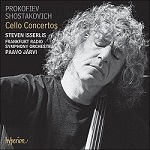 Dmitri
SHOSTAKOVICH (1906-1975)
Dmitri
SHOSTAKOVICH (1906-1975)
Cello
Concerto No. 1 in E flat, Op.107 [27:17]
March from ‘Music for Children’ (arr. Gregor Piatigorsky) [1:35]
Steven Isserlis (cello)
Frankfurt Radio Symphony Orchestra/Paavo Järvi
rec. Frankfurt Radio Hall, 3-4 July 2013 and live Alte Oper Frankfurt,
12-13 December 2013. DDD
HYPERION CDA68037 [65:19] – from hyperion-records.co.uk
(m3, 16- and 24-bit lossless)
A valuable new recording but not necessarily replacing existing recommendations.
Please see review
by Geoffrey Molyneux.
Paul HINDEMITH (1895-1963)
Konzertmusik for piano, brass and harps, Op.49 [24:18]
Concerto for Orchestra [12:23]
Amor und Psyche (Farnesina) [7:09]
Monique Haas (piano)*
Berlin Philharmonic Orchestra/Paul Hindemith
first released as DG DGM18474 in 1958. ADD/mono
NAXOS CLASSICAL ARCHIVES 9.81113 [43:50] – from emusic.com
(mp3). Not available in the USA and several other countries.
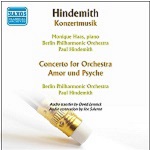 There
are not too many recordings of Op.49, so this, conducted by the man
himself in the mid-50s, is very valuable, though the 3-CD DG set which
Rob Barnett reviewed
(4747702) is more comprehensive and remains available.
There
are not too many recordings of Op.49, so this, conducted by the man
himself in the mid-50s, is very valuable, though the 3-CD DG set which
Rob Barnett reviewed
(4747702) is more comprehensive and remains available.
The emusic.com transfer is inexpensive (£2.10) but the bit-rate is ludicrously
low, with some tracks at 154kb/s, less than half the ideal 320kb/s,
which may account for the rather shallow sound of a recording which
was praised for realism on its release in 1958. Add the fact that there
are no notes to the low bit-rate and you have two persistent causes
of complaint which my colleagues and I have about downloads.
Certainly the streamed version from Qobuz
sounds firmer and, at £2.39, doesn’t cost much more to download in lossless
sound. In fact, you may wish to stream it first: the music here is
not the most immediately approachable of Hindemith’s 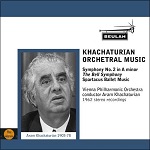 output,
so it’s worth trying it from Qobuz first.
output,
so it’s worth trying it from Qobuz first.
Aram KHACHATURIAN (1903-1978)
Having already provided us with good transfers of Khachaturian’s Piano
Concerto and Violin Concerto, Beulah now give us the Second Symphony
and excerpts from the Gayaneh ballet music in recordings
conducted by the composer with the VPO in 1962. (2PD96 - from
amazon.co.uk, mp3, or iTunes,
m4a). I’ve already reviewed this as a Beulah Korean release in 2014/11.
Robin MILFORD (1903–59) Chamber Music
Phantasy Quintet, Op.33 [11:36]
Idyll, Op.57 [5:03]
Clarinet Trio in F, Op.87 [18:09]
Threne, Op.81 [3:01]
Lyrical Movement, Op.89 [6:39]
Prelude, Op.92 [3:57]
Sonata in D, Op.77 [21:05]
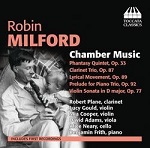 Robert
Plane (clarinet); Lucy Gould, Mia Cooper (violins); David Adams (viola);
Alice Neary (cello); Benjamin Frith (piano); Gould Piano Trio
Robert
Plane (clarinet); Lucy Gould, Mia Cooper (violins); David Adams (viola);
Alice Neary (cello); Benjamin Frith (piano); Gould Piano Trio
TOCCATA CLASSICS TOCC0244 [69:31] – from eclassical.com
(mp3 and lossless, with pdf booklet) or purchase CD for £10.50, post-paid
world-wide, from MusicWeb-International.
See review
by Philip R Buttall: Recording of the Month. ‘With outstanding
performances throughout, excellent recording and presentation, this
is one of the best recent CDs of its kind.’
Nothing here is quite such a find as Robin Milford’s Violin Concerto
(EMRCD023 –
review and review
and Recording of the Month DL
News 2014/12) but it’s all very attractive, well within the mainstream
of 20th-century English music but never derivative, excellently
performed and very well recorded. Just the thing after a hectic day.
Dmitri SHOSTAKOVICH (1906-1975)
Piano Concerto No.1 in c minor for piano, trumpet and strings, Op. 35
[21:47]
Piano Concerto No.2 in F, Op.102 [18:36]
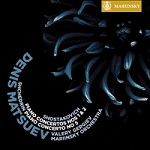 Rodion
Konstantinovich SHCHEDRIN (b.1932) Piano Concerto No.5 [33:04]
Rodion
Konstantinovich SHCHEDRIN (b.1932) Piano Concerto No.5 [33:04]
Denis Matsuev (piano); Mariinsky Orchestra/Valery Gergiev
rec. Mariinsky Theatre, St. Petersburg, December 2010.
MARIINSKY MAR0509 [73:27] – from hyperion-records.co.uk
(mp3, 16- and 24-bit lossless, with pdf booklet)
We seem to have missed these energetic performances when they were released
in 2012, but their appearance as downloads gives me the opportunity
to welcome them and herald the addition of the Mariinsky label to Hyperion’s
download offerings.
Bargain lovers should bear in mind the Classics for Pleasure recording
of Dmitri Alexeev in the two Shostakovich concertos plus the delectable
mini concerto from The Unforgettable Year 1919 (3822342 –
review
and review).
Olivier MESSIAEN (1908-1992)
Des Canyons aux Étoiles (From the Canyons to the Stars) for piano
solo, horn, xylorimba, glockenspiel and orchestra (1970-1974)
Tzimo Barto (piano), John Ryan (horn), Andrew Barclay (xylorimba), Erika
Öhman (glockenspiel)
London Philharmonic Orchestra/Christoph Eschenbach
rec. live Royal Festival Hall, London, 2 November 2013. DDD
LPO LIVE LPO0083 [51:09 + 49:47] – from eclassical.com
(mp3, 16- and 24-bit lossless, with pdf booklet)
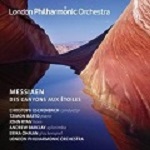 At
last a recording of this elusive late work to challenge the hegemony
of Myung Whun Chung (DG mid-price 4716172 – review
– or 4790114, 10 CDs, or 4801333, 32 CDs), which has held
the field virtually single-handed since Esa-Pekka Salonen’s recording
disappeared (last seen as extremely good value on SonySB2K87951,
with Oiseaux Exotiques and Couleurs de la Cité Céleste
– review).
At
last a recording of this elusive late work to challenge the hegemony
of Myung Whun Chung (DG mid-price 4716172 – review
– or 4790114, 10 CDs, or 4801333, 32 CDs), which has held
the field virtually single-handed since Esa-Pekka Salonen’s recording
disappeared (last seen as extremely good value on SonySB2K87951,
with Oiseaux Exotiques and Couleurs de la Cité Céleste
– review).
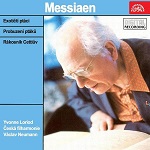 The
live performance, given without interval, may lack some of the accuracy
of those two studio recordings but more than makes up in atmosphere
and the recording sounds excellent.
The
live performance, given without interval, may lack some of the accuracy
of those two studio recordings but more than makes up in atmosphere
and the recording sounds excellent.
My Bargain of the Month is also a Messiaen recording,
featuring Yvonne Loriod at the piano with the Czech Philharmonic and
Vaclav Neumann in Oiseaux Exotiques (1955/56), La Bouscarle
(1956) and Réveil des Oiseaux (1953) on Supraphon, now available
only in a 6-CD set but to be had separately from emusic.com
for just £1.26. The performances are authoritative; the recording is
good and the bit-rate respectable, though not perfect at around 224kb/s.
It’s very naughty of Supraphon to display ‘Digital Recording’ on the
cover when these were set down to the best of my knowledge around 1967.
The original LP, SUAST50749, deservedly won the Prix Edison.
John JOUBERT (b.1927) Symphony No.2 in one movement op.68 (In
memory of those killed at Sharpeville, 21.3.60) (1970) [22:36]
WILLIAM ALWYN (1905-1985) Prelude from The Fairy Fiddler
(1924) [9:45]
Derrybeg Fair from ‘The Fairy Fiddler’ (1925) [3:56]
CARLO MARTELLI (b.1935) Symphony, Op.4 (1955-56) [34:21]
Royal Scottish National Orchestra/Martin Yates
World premiere recordings
rec. RSNO Centre, Henry Wood Hall, Glasgow, 11-12 January 2011. DDD
DUTTON CDLX7270 [71:10] – from emusic.com
(mp3, NO booklet)
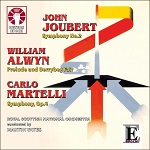 Please
see reviews by Rob
Barnett and John
France.
Please
see reviews by Rob
Barnett and John
France.
Apart from the two Alwyn pieces, the music here is pretty tough going,
but well worth persevering with. As all these are without rivals, there
are no benchmarks, but the performances are as persuasive as could be
imagined.
The emusic.com download, as usual, is at a low bit-rate but, at around
240kb/s, it’s little short of what you could expect for a higher price
from Amazon and iTunes – how long must we wait for 320kb/s mp3 to become
standard, with lossless also on offer from all providers? As it happens,
it sounds more than acceptable and, at £2.94, it represents good value.
The other problem is that with music so little known we really need
the booklet of notes. You won’t even get the booklet if you pay more
for the streamed or lossless download from Qobuz.
The two reviews listed will help, but how long must we wait for pdf
booklets to become standard?
Emusic.com also have the Lyrita recording of Joubert’s Symphony No.1
– here.
Discovery of the Month
Irving FINE (1914-1962) Complete Orchestral Works
Toccata Concertante (1947) [11:05]
Notturno for Strings and Harp (1951) [13:14]
Serious Song, a Lament for String Orchestra (1955) [9:33]
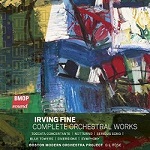 Blue
Towers (1959) [3:06]
Blue
Towers (1959) [3:06]
Diversions for Orchestra (1960) [8:57]
Symphony (1962) [21:07]
Boston Modern Orchestra Project/Gil Rose
rec. 2014, Rogers Center for the Arts, North Andover; Jordan Hall, Boston
BMOP/SOUND 1041 [66:56] – from Amazon
UK or Amazon
US; stream or download from Qobuz.
NO booklet with download.
I enjoyed this album for the very reasons that probably explain its
neglect – it’s twentieth-century music that remains demonstrably in
a line of descent from earlier traditions in a way that had ceased to
be fashionable.
Please see my full review.
Sir Malcolm ARNOLD (1921–2006)
The Roots of Heaven (1958) [34:02]
David Copperfield (1969) [28:04]
Score restorations by John Morgan
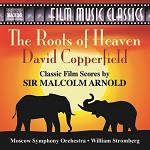 Moscow
Symphony Orchestra/William Stromberg
Moscow
Symphony Orchestra/William Stromberg
rec. Mosfilm Studio, Moscow, 4–7 April 2000. DDD
NAXOS 8.573366 [62:09] – from classicsonline.com
(mp3, with pdf booklet)
(from Marco Polo 8.225167 – review
and 4/5-star review)
There’s a Chandos recording which features a suite from David Copperfield
and the overture to The Roots of Heaven (CHAN9851) but
at 11:10 and 4:49 respectively it’s less comprehensive than the Naxos
reissue. With good recording, even in pdf, these idiomatic performances
were well worth reissuing. Surprisingly, when I checked classicsonline’s
new HD:LL service still offered only the original Marco Polo album.
Sir Malcolm ARNOLD (1921-2006)
Symphony No.7 Op.113 (1973) [38:04]
Symphony No.8 Op.124 (1978) [25:51]
National Symphony Orchestra of Ireland/Andrew Penny
rec. 21-22 February 2000, National Concert Hall, Dublin, Eire
Pdf booklet included
NAXOS 8.552001 [63:55] – from eclassical.com
(mp3, 16-bit lossless)
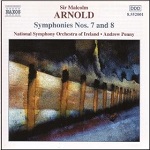 I
recently reacquainted myself with Andrew Penny’s Malcolm Arnold cycle
and was reminded of what a remarkable achievement it is. The 5-CD box
set was well received by Brian Wilson back in 2007 (review)*,
while in 2001 Paul Serotsky and Rob Barnett penned a joint review of
the 7th and 8th symphonies (review).
The latter is very detailed and very positive, and I wholeheartedly
endorse their conclusions. Happily, the terrific range and weight of
these recordings has been carried over to the 16-bit flacs; indeed,
the mp3s sound pretty good as well. The level of detail is impressive
and there’s no hint of a fatiguing treble.
I
recently reacquainted myself with Andrew Penny’s Malcolm Arnold cycle
and was reminded of what a remarkable achievement it is. The 5-CD box
set was well received by Brian Wilson back in 2007 (review)*,
while in 2001 Paul Serotsky and Rob Barnett penned a joint review of
the 7th and 8th symphonies (review).
The latter is very detailed and very positive, and I wholeheartedly
endorse their conclusions. Happily, the terrific range and weight of
these recordings has been carried over to the 16-bit flacs; indeed,
the mp3s sound pretty good as well. The level of detail is impressive
and there’s no hint of a fatiguing treble.
The performances are very powerful, although Rumon Gamba and the BBC
Philharmonic’s accounts on Chandos – available as part of a well-priced
download
of Nos. 7-9 – are blessed with an exceptional recording. I must agree
with Rob Barnett, though, that despite the undoubted virtues of Penny’s
Seventh and Eighth the Handley versions on Decca/Conifer are still the
ones to beat. I had occasion to write recently that the latter’s way
with Arnold’s music always seems so unassailably right. Still,
you won’t feel short-changed by Penny’s thoughtful and dramatic readings;
and while his Irish band may not be front-rankers they play with a passion
and commitment that’s a joy to hear.
Fifteen years on and these performances are still up there with the
best; excellent recording, too.
Dan Morgan
* NB: The Naxos box set which I reviewed is no longer available.
For the Chandos budget twofer of Symphonies Nos. 7-9 and the Oboe Concerto,
conducted by Rumon Gamba, CHAN9967, please see DL
News 2015/2. Chandos are about to reissue in April 2015 a budget-price
4-CD box set of all Malcolm Arnold’s symphonies, with Richard Hickox
and Rumon Gamba (CHAN10853). It’s already available for download
in mp3 and lossless sound from theclassicalshop.net.
You may also be interested in Dan’s review
of the Dutton recording of Symphony No.7 and in a recent contribution
to the MusicWeb International Message Board. BW
Discovery of the Month
John KINSELLA (b.1932)
Symphony No.5: The 1916 Poets (1992)* [34:43]
Symphony No.10 (2010) [31:57]
Gerard O’Connor (baritone)*
Bill Golding (speaker)*
RTÉ National Symphony Orchestra/Colman Pearce*
Irish Chamber Orchestra/Gabor Takacs-Nagy
rec. live 18 February 1994, National Concert Hall, Dublin (Symphony
No. 5), and 11 February 2012, Royal Dublin Society Concert Hall, Dublin,
(Symphony No. 10)
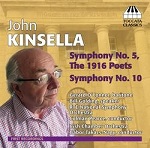 Texts
included
Texts
included
Premiere recordings
TOCCATA CLASSICS TOCC0242 [66:40] – from eclassical.com
(mp3 and lossless, with pdf booklet)
Very powerful and often disturbing music. The Fifth symphony contains
poetry by those executed for their part in the Easter 1916 uprising,
part declaimed and part sung, and the more recent Tenth is equally striking.
This is not music for late-night listening, but I shall be returning
to it.
The recordings are separated by almost twenty years, but both sound
fine, and there’s an analytical and informative booklet as part of the
deal.
Alfred SCHNITTKE (1934-1998)
Symphony No. 3 (1981) [52.16]
Tobias Berndt (organ), Heike Gneiting (piano)
Rundfunk-Sinfonieorchester Berlin/Vladimir Jurowski
rec. July 2014, Großer Sendesaal, Haus des Rundfunks, RBB, Berlin; October
2014 Seifert organ, St. Matthias-Kirche, Schöneberg, Berlin, Germany
PENTATONE PTC5186485 [52.16] – from eclassical.com
(mp3, 16- and 24-bit lossless)
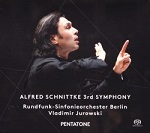 In
his recent CD review
Michael Cookson described this performance as ‘out of this world’ and
predicted it would be one of his Recordings of the Year. As I’d only
heard the BIS version with Eri Klas and the Royal Stockholm Philharmonic
under Eri Klas – now available from eclassical
as part of a reasonably priced bundle of all 10 Schnittke symphonies
– I was intrigued at the possibility of a more thrilling, knottier account
than that. As with most downloads you can just select the tracks that
take your fancy. The BIS sound – big, bold and extremely immersive –
is excellent too.
In
his recent CD review
Michael Cookson described this performance as ‘out of this world’ and
predicted it would be one of his Recordings of the Year. As I’d only
heard the BIS version with Eri Klas and the Royal Stockholm Philharmonic
under Eri Klas – now available from eclassical
as part of a reasonably priced bundle of all 10 Schnittke symphonies
– I was intrigued at the possibility of a more thrilling, knottier account
than that. As with most downloads you can just select the tracks that
take your fancy. The BIS sound – big, bold and extremely immersive –
is excellent too.
The seat-pinning start of this extraordinary work – described by one
commentator as ‘the Rheingold prelude cubed and cubed again’
– gives way to panoplies of glorious sounds that can’t fail to entrance
and entertain. Buried in the music are monograms of German composers,
as if Schnittke were acknowledging his musical forebears. At the same
time it’s as if he’s reinventing the symphony, gathering other disparate
strands to fashion something entirely different. Nothing remarkable
about that, you might say; well, few late-twentieth-century composers
have done so with such energy and imagination as Schnittke. Indeed,
there’s not a dull moment in this sprawling, kaleidoscopic score.
How do the Klas and Jurowski versions compare? The latter’s patched-in
organ isn’t quite as thrilling, but then his is a cool, analytical and
approach. Also, he’s also quite measured, whereas Klas is far more spontaneous
= volatile, even. Both have their strengths, but I do find Jurowski
a little too well-mannered for my tastes. That said, he certainly coaxes
the most ravishing colours from his attentive players. Not only that,
he takes the longer view, building musical structures brick by painstaking
brick.
Such meticulous attention to detail isn’t without its problems, though;
all too often the narrative thread is stretched to breaking point, and
that’s never a problem with the Klas performance. But just when you
think Jurowski has fallen out of contention he surprises with music-making
of sudden strength and insight. The PentaTone recording is exceptionally
vivid and well balanced – the piano and other solo instruments are easily
heard – and orchestral timbres are simply breath-taking. However, in
the Scherzo, for instance, the BIS recording is very impressive
indeed.
Jurowski, superbly recorded, is just too polished and polite; I much
prefer the grittier, impulsive Klas.
Dan Morgan
Spirit, Strength and Sorrow: Five settings of the Stabat Mater
Alissa FIRSOVA (b.1986) Stabat Mater [8:32]
Tõnu KÖRVITS (b.1969) Stabat Mater [11:17]
Claudio CASCIOLINI (1697-1760) Stabat Mater [10:08]
Matthew MARTIN (b.1976) Stabat Mater [10:21]
Domenico SCRALATTI (1685-1757) Stabat Mater a 10 voci
[23:24]
The Sixteen/Harry Christophers
rec. St Augustine’s Church, Kilburn, London, June 2014
CORO COR16127 [68:45] Sample/download (mp3, aac and 24-bit lossless,
with pdf booklet containing texts and translations) from thesixteendigital.com.
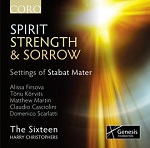
Spirit, Strength and Sorrow features performances by The Sixteen/Harry
Christophers of three new settings of the Stabat Mater, by three
contemporary composers, commissioned by the Genesis Foundation, alongside
earlier settings.
Old and new don’t always make good bedfellows but here the contemporary
compositions sit very well alongside the plainsong setting which opens
the album and the older works. It helps to have performances of high
quality and, predictably, The Sixteen don’t let us down, while the 24-bit
download sounds excellent. As with Flights of Angels (above)
the notes, by Michael White, are especially helpful.
With this and other Coro downloads, happy as I am to see 24-bit, I’m
still left wondering why no 16-bit lossless version is on offer, except
for the Guerrero and Lobo album (above), which is offered in 16-bit
but not 24-bit.
David ELLIS (b.1933)
Vale Royal Suite [11:33]
Diversions, Op.39 (1974) [10:37]
Concert Music, Op.24 (1959, premiere 1972) [19:06]
Trilogy, Op.34: Celebration [7:26]
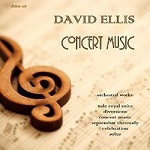 September
Threnody, Op.91 (2011) [10:11]
September
Threnody, Op.91 (2011) [10:11]
Solus, Op.37 (1973) [9:40]
Manchester Sinfonia/Richard Howarth; Northern Chamber Orchestra/Nicholas
Ward; Royal Northern College of Music Symphony Orchestra/Edward Downes;
Manchester Camerata/Frank Cliff
rec. Concert Hall, Royal College of Music, Manchester, 2 June 1973 (Solus);
BBC Studio 7, Manchester, 29 June 1981 (Celebration); St. Thomas’ Church,
Stockport, 10 January 2009 (Vale Royal Suite); 20 May 2013 (Diversions
& September Threnody); 1 August 2013 (Concert Music). ADD/DDD
DIVINE ART DDA25119 [68:33] – from theclassicalshop.net
(mp3 and lossless, with pdf booklet)
I originally intended to include some brief words about this recording
in Download News as a pendant to John France’s review.
However I couldn’t let it go at that, if only for the sake of congratulating
Divine Art yet again on rescuing a composer whose music is so undeserving
of neglect. Please see my full review.
Bob CHILCOTT (b.1955)
St John Passion (2013)
Laurie Ashworth (soprano); Ed Lyon (tenor - Evangelist); Darren Jeffery
(bass-baritone – Pilate); Neal Davies (bass – Christ)
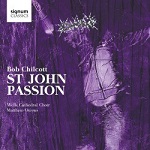 Jonathan
Vaughn (organ); Wells Cathedral Oratorio Society; Wells Cathedral Voluntary
Choir; Wells Cathedral Choir; Instrumental Ensemble/Matthew Owens
Jonathan
Vaughn (organ); Wells Cathedral Oratorio Society; Wells Cathedral Voluntary
Choir; Wells Cathedral Choir; Instrumental Ensemble/Matthew Owens
rec. May, 2014, Wells Cathedral, Somerset, UK
English texts included
SIGNUM CLASSICS SIGCD412 [67:46] – from hyperion-records.co.uk
(mp3, 16- and 24-bit lossless, with pdf booklet)
Please see review
by John Quinn: ‘This is an appealing, sincere and expertly crafted score
and hearing it again in this very fine recording has moved me as much
as that first performance.’
I wanted to include this in time for Holy Week, which means that I have
had time only to sample, but I can endorse John Quinn’s recommendation.
My high expectations from hearing earlier recordings of Bob Chilcott’s
music were by no means disappointed.
Kevin O’CONNELL (b.1958)
North (1997/8) [20:01]
Four Orchestral Pieces (2003/6) [29:47]
Symphony (2007/10) [28:22]
RTÉ National Symphony Orchestra/Gavin Maloney
rec. National Concert Hall, Dublin, April 2010 and April 2011
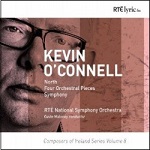 RTÉ
LYRIC FM CD144 [78:09] – from
emusic.com (mp3, NO booklet) or stream from Qobuz
RTÉ
LYRIC FM CD144 [78:09] – from
emusic.com (mp3, NO booklet) or stream from Qobuz
As no booklet is available with the download or streamed version, you
need to read Herbert Culot’s review
for important information about this ‘very strong release’.
Readers who know my aversion to the more extreme forms of contemporary
music can be reassured that, though I may not share all of Herbert Culot’s
enthusiasm, I did enjoy these recordings. You may still prefer to try
first via Qobuz.
The emusic bit-rate, around 220kb/s, is not generous, but sounds adequate.
If you want the tracks to play in the correct order, you will need to
re-number 1 to 01, etc.
Discovery of the Month
Elena RUEHR (b. 1963)
Shimmer for string orchestra (1995) [11:33]
Vocalissimus for chamber orchestra (1991) [7:50]
 Cloud
Atlas for cello, harp and string orchestra* (2011) [16:56]
Cloud
Atlas for cello, harp and string orchestra* (2011) [16:56]
O’Keeffe Images for orchestra (Summer Days (2013) [11:45]; Sky
above Clouds (1993) [9:31]; Ladder to the Moon (2003) [11:45])
Jennifer Kloetzel (cello)*
Boston Modern Orchestra Project/Gil Rose
rec. 2003-14, Jordan Hall, Boston; St. Mark’s School, Southborough.
pdf booklet available here.
BMOP/SOUND1039 [69:22] – from Amazon
UK or
Amazon US (mp3) or stream from Qobuz.
A very pleasant surprise indeed – music in a modern idiom but melodic
and approachable: if you like Arvo Pärt and John Tavener you should
enjoy this album. Please see my full review.
Matthew MARTIN (b.1976) Jubilate Deo
Jubilate Deo * [3:45]
I saw the Lord (In the Year that King Uzziah Died) [10:58]
Christe redemptor omnium [4:12]
Chester Missa Brevis [22:20]
Te lucis ante terminum [3:16]
St John’s College Service: Magnificat and Nunc Dimittis*
[8:25]
Justorum animæ [2:32]
Dormi, Jesu !* [3:17]
A Hymn of St Ambrose (Aurora lucis rutilat)* [3:58]
Short Mass of St Dominic* [9:19]
A Song of the New Jerusalem* [4:53]
Laudate Dominum * [3:44]
* world premiere recording
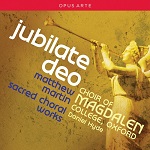 Choir
of Magdalen College, Oxford/Daniel Hyde
Choir
of Magdalen College, Oxford/Daniel Hyde
rec. date?
OPUS ARTE OACD9030D [71:16] – from classicsonline.com
(mp3,) or stream from Naxos
Music Library (no booklet from either: back cover image only)
If I say that Matthew Martin’s music stands in a clear line of descent
from 20th-century English church music, that’s not meant
as a criticism: it means that I was readily able to identify with it.
The lack of a booklet – only the cover and the back cover – is particularly
reprehensible in the case of a young composer about whom the potential
purchaser/listener is likely to know very little. It also means that
I can’t give a recording date.
Don’t believe the timing given by COL of over 80 minutes: the back cover
correctly gives the time as 71:16. COL’s/NML’s times for the Chester
Mass are also well out: the Gloria lasts 3:58, not 10:58.
Eriks EŠENVALDS (b.1977)
Passion and Resurrection (2005)* [27:37]
Evening (2006) [3:21]
Night Prayer (2006) [9:23]
A drop in the ocean (2006) [6:43]
Legend of the walled-in woman (2005) [10:23]
Long Road (2010) [6:40]
* Carolyn Sampson (soprano)
Polyphony; *Britten Sinfonia/Stephen Layton
rec. 10, 12-13 April 2010, All Hallows, Gospel Oak, London. DDD
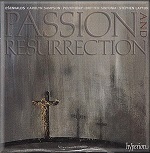 Texts
and English translations included
Texts
and English translations included
HYPERION CDA67796 [64:09] – download from hyperion-records.co.uk
(mp3 and lossless, with pdf booklet)
See review
by John Quinn.
I’m currently listening to the new Ešenvalds CD from Hyperion, again
conducted by Stephen Layton but this time featuring St. John’s College,
Cambridge (Northern Lights and other choral works, CDA68083).
John Quinn has again beaten me to the draw – review
and details – so all I really need say is that both albums contain
some ethereally beautiful music: yet another Eastern European composer
of faith who has something interesting to say and says it in a manner
clearly linked to the music of the past, yet adventurous and varied.
If you need to choose only one for starters, I’d go for the new recording
– from hyperion-records.co.uk
(mp3, 16- and 24-bit lossless).
And the Bridge is Love
Edward ELGAR (1857–1934) Introduction and Allegro for Strings,
Op.47 (1905) [13:59]
Sospiri, Op.70 (1914) [5:11]
William LLOYD WEBBER (1914–1982) The Moon (1950)† [4:31]
Howard GOODALL (b. 1958) And the Bridge is Love (2008)†* [11:31]
Ralph VAUGHAN WILLIAMS (1872–1958) The Charterhouse Suite: No.1
Prelude 91923) [1:42]
Edward ELGAR Serenade for Strings in e minor, Op.20 (1892) [11:39]
Frederick DELIUS (1862–1934) Two Aquarelles (arr. E. Fenby) (1917/1932)
[2:02 + 1:55]
Edward ELGAR Chanson de nuit (arr. W.H. Reed) (1897/1939)*
[4:28]
Chanson de matin (arr. W.H. Reed) (1899/1939)* [3:15]
William WALTON (1902–1983) Two Pieces for Strings from Henry
V (1944) [3:07 + 1:47]
John IRELAND (1879–1962) A Downland Suite: No.3 Minuet (1942)
[4:44]
†World Première Recording
English Chamber Orchestra/Julian Lloyd Webber (cello)*
rec. Watford Colosseum, Watford, Hertfordshire, 22-24 April 2014. DDD
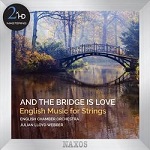 NAXOS
8.573250 [70:07]
NAXOS
8.573250 [70:07]
Also available as 2xHD Naxos 812864019841 from eclassical.com
(mp3, 16- and 24-bit lossless, with pdf booklet)
I almost didn’t include this recording of English music for strings
because the first time that I heard it, streamed from Qobuz, I really
disliked the performance of the opening Elgar Introduction and Allegro
so much that I didn’t bother to download it. I suppose the classic
Barbirolli performance was too much in my thoughts, but the second time
around I judged the new performance on its own merits and liked it much
better. It won’t replace the Barbirolli (Warner/EMI Masters 0851872)
but it benefits from a more modern recording.
The rest of the music is well performed and recorded, too, and with
two attractive premieres to boot, this is well worth considering.











